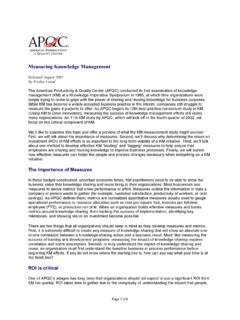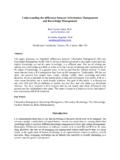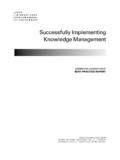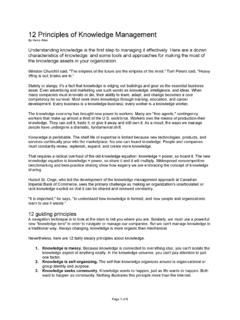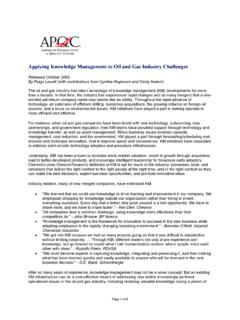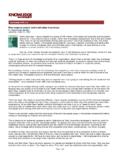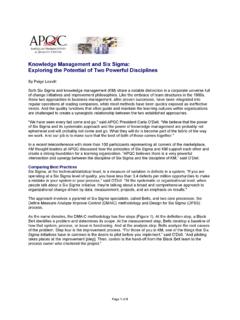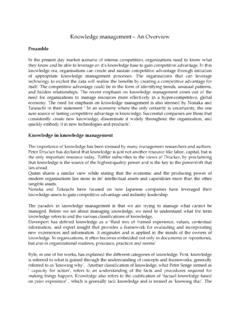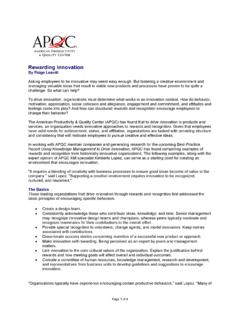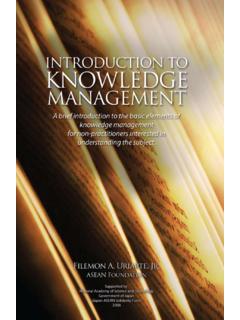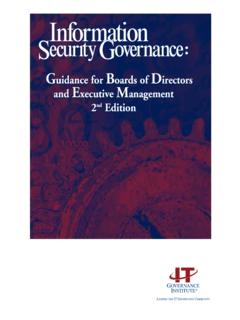Transcription of What is knowledge management? - Provider's Edge
1 what is knowledge management ?Rebecca O. BarclayManaging Editor, knowledge PraxisPhilip C. MurrayEditor-in-Chief, knowledge PraxisBusiness Strategies | what is knowledge | Why do we | Roadblocks to solutionsHistory of KM | disciplinary | Categorization | ConclusionAtKnowledge Praxis, we define knowledge management as a business activity with two primaryaspects:Treating the knowledge component of business activities as an explicit concern of businessreflected in strategy, policy, and practice at all levels of the organization. Making a direct connection between an organization s intellectual assets both explicit[recorded] and tacit [personal know-how] and positive business results. In practice, knowledge management often encompasses identifying and mapping intellectual assetswithin the organization, generating new knowledge for competitive advantage within theorganization, making vast amounts of corporate information accessible, sharing of best practices,and technology that enables all of the above including groupware and covers a lot of ground.
2 And it should, because applying knowledge to work is integral to mostbusiness management is hard to define precisely and simply. (The definition also leapfrogs thetask of defining " knowledge " itself. We ll get to that later.) That s not surprising. How would anurse or doctor define "health care" succinctly? How would a CEO describe " management "? Howwould a CFO describe "compensation"? Each of those domains is complex, with many sub-areasof specialization. Nevertheless, we know "health care" and " management " when we see them, andwe understand the major goals and activities of those strategies related to knowledge managementAs you explore other explanations of knowledge management Bo Newman s KnowledgeManagement Forum is a good starting point you ll detect connections with several well-knownmanagement strategies, practices, and business issues, includingChange management Best practices what is knowledge management ?file:///H|/Web Sites -- Development/ management / what is knowledge (1 of 10) [2/23/2000 4:44:08 PM]Risk management Benchmarking A significant element of the business community also views knowledge management as a naturalextension of "business process reengineering," a fact underscored by the recent announcement thatJohn Wiley s Business Change and Reengineering will become knowledge and ProcessManagement in March, 1997.
3 See ( ~ )There is a common thread among these and many other recent business strategies: A recognitionthat information and knowledge are corporate assets, and that businesses need strategies, policies,and tools to manage those need to manage knowledge seems obvious, and discussions of intellectual capital haveproliferated, but few businesses have acted on that understanding. Where companies havetakeaction and a growing number are doing so implementations of " knowledge management "may range from technology-driven methods of accessing, controlling, and delivering informationto massive efforts to change corporate about the paths, methods, and even the objectives of knowledge management efforts focus on enhancing creativity creating new knowledge value while otherprograms emphasize leveraging existing knowledge . (See below, "Categorization of knowledgemanagement approaches.") what is " knowledge "?Aren t we managing knowledge already? Well, no.
4 In fact, most of the time we re making a really uglymess of managing information. In practice, the terms information and knowledge are often usedinterchangeably by business s choose a simple working definition and get on with it: knowledge has two basic definitions of interest. The first pertains to a defined body of on the definition, the body of information might consist of facts, opinions, ideas, theories,principles, and models (or other frameworks). Clearly, other categories are possible, too. Subject matter( , chemistry, mathematics, etc.) is just one also refers to a person s state of being with respect to some body of information. These statesinclude ignorance, awareness, familiarity, understanding, facility, and so from Fred Nickols, Executive Director Strategic Planning & management ,Educational Testing are many thoughtful and thought-provoking definitions of " knowledge " including theimportant distinctions Gene Bellinger et al.
5 Make in "Data, Information, knowledge , andWisdom". Nevertheless, Nickols provides a good, sensible, functional definition, and it issufficient for our two kinds of knowledge parallel Michael Polanyi s often-quoted distinction betweenexplicit knowledge (sometimes referred to as formal knowledge ), which can be articulated inlanguage and transmitted among individuals, and tacit knowledge (also, informal knowledge ), what is knowledge management ?file:///H|/Web Sites -- Development/ management / what is knowledge (2 of 10) [2/23/2000 4:44:08 PM]personal knowledge rooted in individual experience and involving personal belief, perspective, andvalues. (Polanyi, Michael. The Tacit Dimension. London: Routledge & Kegan Paul. See also KarlE. Sveiby s online description, "Tacit knowledge ."In traditional perceptions of the role of knowledge in business organizations, tacit knowledge isoften viewed as the real key to getting things done and creating new value.)
6 Not explicitknowledge. Thus we often encounter an emphasis on the "learning organization" and otherapproaches that stress internalization of information (through experience and action) andgeneration of new knowledge through managed the opinion of the editors of knowledge Praxis, quibbles about fine distinctions in the meaningof knowledge are just not very important. (See Rant #1: Thinking objectively about subjectiveknowing) It doesn t matter whether a written procedure or a subject matter expert provides asolution to a particular problem, as long as a positive result is achieved. However, observing howknowledge is acquired and how we can apply knowledge whether tacit or explicit in order toachieve a positive result that meets business requirements .. that s a different and very we need knowledge management nowWhy do we need to manage knowledge ? Ann Macintosh of the Artificial Intelligence ApplicationsInstitute (University of Edinburgh) has written a "Position Paper on knowledge Asset management " thatidentifies some of the specific business factors, including:Marketplaces are increasingly competitive and the rate of innovation is rising.
7 Reductions in staffing create a need to replace informal knowledge with formal methods. Competitive pressures reduce the size of the work force that holds valuable businessknowledge. The amount of time available to experience and acquire knowledge has diminished. Early retirements and increasing mobility of the work force lead to loss of knowledge . There is a need to manage increasing complexity as small operating companies aretrans-national sourcing operations. Changes in strategic direction may result in the loss of knowledge in a specific area. To these paraphrases of Ms. Macintosh s observations we would add:Most of our work is information based. Organizations compete on the basis of knowledge . Products and services are increasingly complex, endowing them with a significantinformation component. The need for life-long learning is an inescapable reality. In brief, knowledge and information have become the medium in which business problems a result, managing knowledge represents the primary opportunity for achieving substantialsavings, significant improvements in human performance, and competitive s not just a Fortune 500 business problem.
8 Small companies need formal approaches toWhat is knowledge management ?file:///H|/Web Sites -- Development/ management / what is knowledge (3 of 10) [2/23/2000 4:44:08 PM] knowledge management even more, because they don t have the market leverage, inertia, andresources that big companies do. They have to be much more flexible, more responsive, and more"right" (make better decisions) because even small mistakes can be fatal to to adoption of knowledge management solutionsThere have been many roadblocks to adoption of formal knowledge management activities. In general,managing knowledge has been perceived as an unmanageable kind of problem an implicitly human,individual activity that was intractable with traditional management methods and tend to treat the activities of knowledge work as necessary, but ill-defined, costs of humanresources, and we treat the explicit manifestations of knowledge work as forms of publishing asbyproducts of "real" a result, the metrics associated with knowledge resources and our ability to manage thoseresources in meaningful ways have not become part of business it isn t necessary to throw up one s hands in despair.
9 We do know a lot about how peoplelearn. We know more and more about how organizations develop and use knowledge . The body ofliterature about managing intellectual capital is growing. We have new insights and solutions froma variety of domains and disciplines that can be applied to making knowledge work manageableand measurable. And computer technology itself a cause of the problem can provide newtools to make it all don t need another "paradigm shift" (Please!), but we do have to accept that the nature ofbusiness itself has changed, in at least two important ways: knowledge work is fundamentally different in character from physical knowledge worker is almost completely immersed in a computing environment. Thisnew reality dramatically alters the methods by which we must manage, learn, representknowledge, interact, solve problems, and can t solve the problems of Information Age business or gain a competitive advantage simplyby throwing more information and people at the problems.
10 And you can t solve knowledge -basedproblems with approaches borrowed from the product-oriented, print-based economy. Thosesolutions are reactive and technology blindly to knowledge -related business problems is a mistake, too, but thecomputerized business environment provides opportunities and new methods for representing" knowledge " and leveraging its value. It s not an issue of finding the right computer interface although that would help, too. We simply have not defined in a rigorous, clear, widely acceptedway the fundamental characteristics of " knowledge " in the computing environment. (See"Cooperative development of a classification of knowledge management functions.")A brief history of knowledge managementAn overarching theory of knowledge management has yet to emerge, perhaps because the practicesassociated with managing knowledge have their roots in a variety of disciplines and domains. Specialthanks to Karl Wiig for supplying us with a pre-publication copy of " knowledge management :WhereDid It Come From and Where Will It Go?
